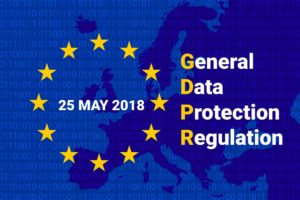

(NicoElNino/Shutterstock)
If the upcoming General Data Protection Regulation (GDPR) is like most government mandates, the thinking goes, it will be a tax on business and a hindrance to productivity. But if you take the right approach, some experts say, the GDPR could actually be a boon to analytics.
By now you’re probably aware that in just 38 days, the European Union begins enforcing GDPR, which was passed two years ago to harmonize a hodge-podge of privacy laws across Europe. The new regulation was designed to, among other things, give EU citizens control over their personal data by imposing stiff penalties for any organizations that use their personal data without consent. It also requires organizations to take certain measures to protect citizens’ personal data, which will (hopefully) reduce the severity and impact of major data breaches.
The law protects the data of 740 million Europeans, more than 10% of the Earth’s population. In other words, when it comes to big global corporations that sell goods and services around the planet, the days of playing fast and loose with peoples’ data are over. While we don’t have an American version of the GDPR (at least not yet), essentially the gig is up for the Wild West days of “anything goes” in the analytics arena.
In that regard, the GDPR is a significant wakeup call for organizations to mature their data management and analytic practices – and to do so quickly. While no corporate leader likes being ordered how to run her company, the prospect of losing up to 4% of annual revenue per GDPR violation provides a compelling incentive to accelerate data management initiatives.
The new regulation is also a boon for software companies that have the experience in building the types of consent-management systems that GDPR requires. The folks at MarkLogic, which develops a multi-model database management system, have been busy with GDPR remediation engagements and have noticed some patterns emerging from the work.
David Gorbet, SVP Engineering for MarkLogic, says GDPR finally caught up with people. “For a long time, they were unprepared,” he tells Datanami. “They didn’t underhand how it impacted them. They thought it was a Europe-only thing. A lot of people didn’t know how to get started.”
GDPR represents a very complex set of requirements that are vastly different from other regulations that impact the collection, storage, and use of data, such as HIPAA or PCI DSS, according to Gorbet: You can’t prove compliance by generating the correct reports. “It’s not a reporting regulation,” he says. “It’s an operationalization regulation. It’s about how you change your operation in order to be compliant with GDPR.”
That makes things tougher, to say the least. Being GDPR compliant requires an organization to understand where all their data resides and what it’s used for, Gorbet says. Then they need to relate that data to potentially millions of individuals, and then create consent management systems to control access to that data. “That’s a lot trickier than a typical compliance operation,” he says.
Over the years MarkLogic’s professional services arm has developed many of these types of consent management systems. It’s software manages consents for big publishing houses that need to understand which customers have legal authority to specific songs and movies. The system helps answer questions like, Is this iTunes consumer entitled to play this song, or is this the director’s commentary for this boxed set of Stephen Spielberg movies entitled to be distributed in this particular region?
Gorbet points out that consent management was also a big part of MarkLogic’s involvement in the development of Healthcare.gov, the much-maligned Obamacare website. Specifically, the MarkLogic database was used to create a Data Services Hub that reached out to databases hosted by the IRS, the Social Security Administration, and others to see whether or not a given citizen is eligible for a specific insurance program.
This is the sort of consent system that every large organization will ultimately need to comply with GDPR, Gorbet says, but building it is not easy. In some cases, customers will move all the relevant data into MarkLogic’s NoSQL database, which features a flexible schema. In other cases, a MarkLogic system will create a virtual layer controlling access to data that lives in other physical data stores, which could include relational databases, Hadoop file stores, object file systems, and mainframe flat files.
Staying on top of what people consent an organization to use their data for and what they do not is also a big challenge. “With GDPR, organizations can ask for consent at whatever level they want… and GDPR allows you to revoke them any time,” Gorbet says. “It’s not just a Boolean yes or no. It can be quite a complex thing.”
So for instance, a customer may give an organization the okay to use his email address to contact him about a certain product, concern, or event, but not allow the organization to use his phone number for them. This personally identifiable information (PII) is some of the most sensitive data that an organization stores on behalf of its customers, but it’s also some of the most valuable data, from an analytics perspective.
According to Gorbet, that level of complexity surrounding the individual permissions in a GDPR project actually jibes well with the capabilities of graph or semantic database, which is one of MarkLogic’s modalities. “Semantic is a great way to traverse that graph, to figure out if a particular entity [is entitled to something],” he says. “Performance is faster. Traceability is better. But in order to apply your policy to the data, you may want to apply it through a ontology.”
GDPR is forcing organizations to get smart about how they store PII data in order to protect the privacy of individuals. But that work also brings side benefits to the organization in the form of better organized data and a finer-grained view of their customers, too.
“Now for the first time ever, they can understand their exposure to a particular individual, which is a really big business benefit,” Gorbet says. “With a data hub they don’t have to [repeat the process]. Subsequent use cases are actually cheaper because the data is all in one place.”
The better organizations are at adhering to the new requirements under GDPR, the better organized their customer data will be, and the more analytical options will open up to them, Gorbet says.
“The smart companies are not seeing GDPR as a tax that they have to pay,” he says. “They’re seeing it as a reason to finally build that customer 360 view that they always wanted.”
Related Items:
Are Strict New Data Regulations In the Offing?
Momentum Builds for a ‘Data Labor Movement’
Big Data Backlash: A Rights Movement Gains Steam
May 13, 2024
- Qubrid AI Launches New AI Model Studio on Latest GPU Cloud Infrastructure
- Indico Data Launches LLM Benchmark Site for Document Understanding
May 10, 2024
May 9, 2024
- Lightning AI Launches Its Studio Platform in AWS Marketplace
- Precisely Continues to Expand Reach and Capabilities for Data Enrichment and Geo Addressing
- Databricks Enhances Enterprise AI with RAG Applications and Improved Model Serving
- StarTree Extends Real-Time Analytics Capabilities for Observability and Anomaly Detection Use Cases
- Snowflake Unveils the Future of AI and Data at 6th Annual Data Cloud Summit
May 8, 2024
- IBM and SAP Announce New Generative AI Capabilities to Transform Business Processes
- Alteryx: Businesses Embrace Generative AI, but General Public Remains Wary
- Atlan’s Control Plane to Power Data & AI Governance Attracts $105M
- Cisco Unlocks AI-Powered Intelligence for Self-Hosted Observability
- Boomi Accelerates Enterprise Data Connectivity with Advanced API Management Acquisitions
- Elastic Security Labs Releases Guidance to Avoid LLM Risks and Abuses
- Neo4j Empowers Syracuse University with $250K Grant to Tackle Misinformation in 2024 Elections
- Cloudera Unveils New Flow Management and Streaming Operators at Red Hat Summit
- DataForge Open-Sources First Functional Data Programming Framework
May 7, 2024
Most Read Features
Sorry. No data so far.
Most Read News In Brief
Sorry. No data so far.
Most Read This Just In
Sorry. No data so far.
Sponsored Partner Content
-
Get your Data AI Ready – Celebrate One Year of Deep Dish Data Virtual Series!
-
Supercharge Your Data Lake with Spark 3.3
-
Learn How to Build a Custom Chatbot Using a RAG Workflow in Minutes [Hands-on Demo]
-
Overcome ETL Bottlenecks with Metadata-driven Integration for the AI Era [Free Guide]
-
Gartner® Hype Cycle™ for Analytics and Business Intelligence 2023
-
The Art of Mastering Data Quality for AI and Analytics
Sponsored Whitepapers
Contributors
Featured Events
-
AI & Big Data Expo North America 2024
 June 5 - June 6Santa Clara CA United States
June 5 - June 6Santa Clara CA United States -
CDAO Canada Public Sector 2024
 June 18 - June 19
June 18 - June 19 -
AI Hardware & Edge AI Summit Europe
 June 18 - June 19London United Kingdom
June 18 - June 19London United Kingdom -
AI Hardware & Edge AI Summit 2024
 September 10 - September 12San Jose CA United States
September 10 - September 12San Jose CA United States -
CDAO Government 2024
 September 18 - September 19Washington DC United States
September 18 - September 19Washington DC United States




























